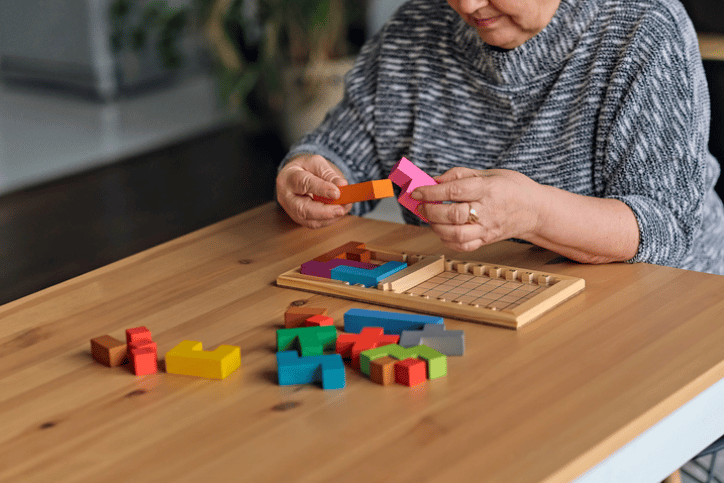Memory Care Myths

Everyone has moments they forget something, but memory care becomes a necessity when forgetfulness starts impacting one’s quality of life and safety. Does your loved one forget the names and faces of people they know? Did they leave the stove on? Usually proud of their appearance, have you noticed that your mom is now disinterested in bathing, grooming, and getting dressed up? These might be signs of dementia-related memory loss.
According to the Alzheimer’s Association, dementia is “a general term for symptoms like decline in memory, reasoning or other thinking skills.” Although it is not a normal part of aging, this decline is prevalent in adults 65 years and older and can be caused by Alzheimer’s, one of the most common types of dementia. As Alzheimer’s advances, people can become disoriented and confused, while experiencing behavior changes. Eventually, walking, speaking, and even swallowing will become difficult for them.
All these changes are as traumatic for the person experiencing them, as they are for the loved ones noticing the changes. It can be stressful for everyone, and this is where memory care can help. It gives support where needed, but promotes independence and improves quality of life by encouraging the individual to engage in the tasks and activities they can still perform and enjoy.
At United Methodist Communities, our Alzheimer’s and dementia memory care service is called Tapestries. Every life is like a beautiful tapestry that tells a story, and we feel privileged to share the lives of our residents and their families. We find there are memory care myths and would like to ease the concerns of loved ones, while sharing more about Tapestries Memory Care.
Top Five Memory Care Myths
Thousands of older adults live in assisted living communities where they socialize with their peers, and participate in activities they enjoy, with easy access to medical care and other services. This same lifestyle is offered to people in memory care, but there continue to be negative perceptions about it. Let’s look at the top five memory care myths.
- Removes Independence
The core of the Alzheimer’s Association Dementia Care Practice Recommendations is a person-centered focus, where a person’s independence is supported by a “doing with” rather than a “doing for” caring relationship. Tapestries received an Alzheimer’s Association Certificate of Recognition, for incorporating specific recommendations in our associate training, including person-centered care.
- Not Engaging
In Tapestries, we respect the preferences of each resident. They can choose to engage in activities independently, one-to-one, in small groups, or in large groups, depending on their personality and needs.
- Impersonal Cookie Cutter Approach
Every person with dementia is unique, and in Tapestries, we focus on their strengths rather than their frailties and medical complexities. The life patterns of residents are respected, so for example, they sleep when tired and wake when refreshed. Each resident sets their own schedule. There is no “one-size-fits-all” program here.
- I Can Take Care of My Loved One Best
In a report by the Alzheimer’s Association, their research shows that as a person with dementia’s symptoms worsens, family caregivers experience increased emotional and financial stress, as well as health problems. With Tapestries Memory Care, you can return to being a caring family member rather than a sole caregiver suffering from burnout
- Memory Care Communities Are Institution-Like Settings
Tapestries residences are part of Assisted Living neighborhoods. Each person has a one-bedroom apartment in a secure residence where they share a fireplace, dining room, living room, country kitchen, common open spaces, and a large activity area with a group of fellow residents.
What Our Memory Care Actually Is
Did you know that you can look at the floor plans of the residences at our Tapestries Memory Care communities online? We follow a social/comfort model where we provide care for a broad spectrum of needs, rather than a medical model. It encourages residents to live in a homelike, nurturing environment where they can have meaningful experiences every day.
To enhance security and maximize safety, we have nurse call and wander management systems that keep residents safe, but independent. At Tapestries, we have LETS (Life Enrichment Team Specialists) to care for various neurocognitive disorders and related dementias. They become familiar with each resident’s history, culture, routines and preferences, to anticipate a resident’s needs when necessary. We let people engage in things that make sense to them and not what others prescribe.
Do you want to schedule a personal tour of one of the four full-service assisted living locations where Tapestries Memory Care is offered? Do you have questions about memory care at United Methodist Communities in NJ? For more information and peace of mind, please contact our team today or visit us at: https://umcommunities.org/




